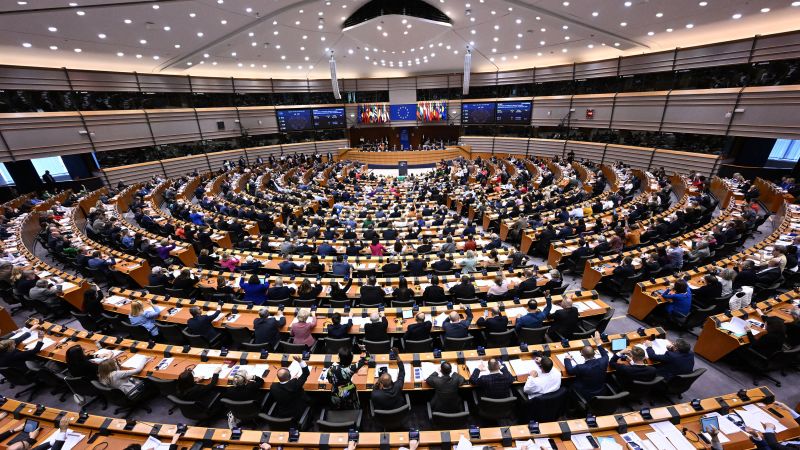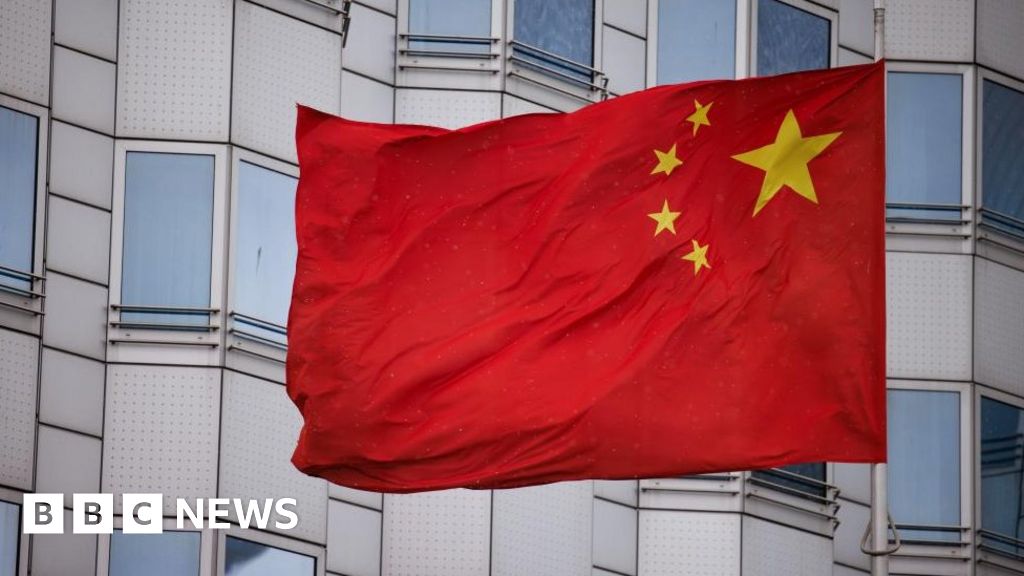
German police have arrested an aide to far-right MEP Maximilian Krah on suspicion of spying for China, passing information on the European Parliament to China's Ministry of State Security. The arrest has raised worries about democracy ahead of the EU elections in June, with links to Russian influence operations also being reported. The arrested individual, Jian G, was allegedly involved in spying on Chinese opposition figures in Germany. The German authorities have not disclosed the politician who employed the aide, but media reports have connected him to Krah. Investigations are ongoing to address the seriousness of the espionage allegations.

Three German citizens were arrested in Germany for espionage for China, accused of spying and transferring information on technology with potential military uses since before June 2022. The suspects violated German export laws, with one serving as an agent for an employee of China's Ministry of State Security. The trio used a company in Duesseldorf to contact German researchers and procure innovative technologies. They were in negotiations for further research projects to enhance the Chinese navy's combat strength and illegally exported a special laser to China, classified as a dual-use instrument under EU rules.

Maximilian Krah (born January 28, 1977) is a German lawyer and self-described right-wing politician. He is serving as a member of the European Parliament for the far-right Alternative for Germany.

President of Renew Europe, Valerie Hayer, has written to the European Parliament President calling for an urgent investigation into reports of a Russian influence network paying current or former members of the European Parliament. The Czech Republic and Poland reported that a pro-Russian network aimed to influence European elections by paying politicians through the Voice of Europe website. Allegations include payments to politicians from Germany, France, Poland, Belgium, the Netherlands, and Hungary. Russian oligarch Viktor Medvedchuk and Artyom Marchevsky were named as key figures, with Czech and Polish authorities seizing substantial amounts of money linked to the network.

Ursula von der Leyen, the European Commission chief, launched her campaign by criticizing France's far-right National Rally party for its ties to Russian President Vladimir Putin. The National Rally has faced accusations of ties to Russia since obtaining a loan in 2014, which they deny. Von der Leyen emphasized the need for parties to be pro-EU, pro-Ukraine, and uphold the rule of law to collaborate with the European Peoples Party. The National Rally is part of the Identity and Democracy group in the European Parliament alongside other far-right parties like the Danish Peoples Party and Alternative for Germany.

The German ambassador to the UK, Miguel Berger, defended a leaked phone call between top German army officials discussing support for Ukraine, stating there is no need for an apology as it was a professional discussion about the use of long-range missiles. The call was intercepted due to an individual mistake via an insecure line, and Germany is cautious about escalating tensions with Russia over providing Taurus missiles to Ukraine. The leaked call highlighted discussions on British involvement in Ukraine's conflict with Russia.

German Chancellor Olaf Scholz has opened a TikTok account, ensuring he will not dance on the platform popular with young people. The move aims to connect with a younger audience and increase information to citizens. The government uses a special phone to post on TikTok to ensure data security. Scholz follows other leaders, like Joe Biden, in joining TikTok despite security concerns. The account provides a behind-the-scenes look at government life. This decision comes before the European Parliament elections and Scholzs visit to China, emphasizing the importance of data protection laws in Europe.

Four Germans, including two sisters and their partners, were caught laying white roses at Adolf Hitler's birthplace in Braunau am Inn, Austria, posing for photos and making Nazi salutes, which are banned in Austria and Germany. Police found Nazi-themed messages on one woman's phone. The group faces suspicion of violating Austrian laws against Nazi symbols. Efforts to transform Hitler's family home into a police station aim to deter Nazi sympathisers.

Bjorn Hocke, the leader of Germany's far-right Alternative for Germany (AfD) party in Thuringia, is facing a trial for using the banned Nazi slogan 'Alles fur Deutschland' (Everything for Germany). The trial opened in Halle before state elections, with Hocke accused of inciting the audience to reply 'Germany' in a speech. Hocke, considered an extremist, faces up to three years in prison for using illegal Nazi symbols. He claimed not to know the slogan's Nazi origins, but prosecutors argue otherwise.

The Ministry for State Security (German: Ministerium für Staatssicherheit, pronounced [minɪsˈteːʁiʊm fyːɐ̯ ˈʃtaːtsˌzɪçɐhaɪ̯t]; abbreviated as "MfS"), commonly known as the Stasi (German: [ˈʃtaːziː] ), an abbreviation of Staatssicherheit, was the state security service of East Germany (the GDR) from 1950 to 1990.The Stasi's function in East Germany resembled that of the KGB in the Soviet Union and previously Gestapo of Nazi Germany—it served as a means of maintaining state authority, i.e., as the "Shield and Sword of the Party" (German: Schild und Schwert der Partei). This was accomplished primarily through the use of a network of civilian informants. This organization contributed to the arrest of approximately 250,000 people in East Germany.The Stasi also conducted espionage and other clandestine operations outside the GDR through its subordinate foreign-intelligence service, the Office of Reconnaissance, or Head Office A (German: Hauptverwaltung Aufklärung or HVA). Its operatives also maintained contacts and occasionally cooperated with West-German terrorists.The Stasi had its headquarters in East Berlin, with an extensive complex in Berlin-Lichtenberg and several smaller facilities throughout the city. Erich Mielke, the Stasi's longest-serving chief, controlled the organisation for 32 (1957–1989) of the 40 years of the GDR's existence. The HVA (Hauptverwaltung Aufklärung), under Markus Wolf (in office as Leiter der HVA from 1952 to 1986), gained a reputation as one of the most effective intelligence agencies of the Cold War.After the German reunification of 1989–1991, some Stasi officials were prosecuted for their crimesand the surveillance files that the Stasi had maintained on millions of East Germans were declassified so that all citizens could inspect their personal files on request. The Stasi Records Agency maintained the files until June 2021, when they became part of the German Federal Archives.

German Chancellor Olaf Scholz believes that the war in Ukraine could drag on for several more years; Nobody could say whether this war might not even last five years, for example, Scholz said on Friday evening in the eastern city of Chemnitz. He defended Germany's military support for Ukraine. In addition, diplomacy must be cultivated, he added. Since the beginning of the war, however, Russian President Vladimir Putin had shown no signs of movement, he said. A dictated peace is unacceptable, emphasized Scholz: "He must not be allowed to get away with this.

The German government has unveiled a 13-point plan to combat right-wing extremism, following weeks of mass protests against the far-right in the country. The plan includes freezing bank accounts, cutting funding for extremists, banning right-wing extremist events, tightening gun laws, and making it easier to dismiss state employees guilty of extremism. According to the interior ministry, there are over 38,000 known right-wing extremists in Germany, with around 14,000 considered potentially violent. The far-right Alternative for Germany (AfD) party continues to gain support, despite the protests. Anti-racism activists fear it may be too late to contain the rise of the far-right.

Chinese Foreign Minister Wang Yi wrapped up a highly successful tour of New Zealand and Australia on Thursday with a private meeting in Sydney alongside former Labor prime minister Paul Keating after a tight schedule. Although there were no major announcements, analysts say the visit was a further sign of the stabilization of the Australia-China relationship under the Labor government headed by Prime Minister Anthony Albanese. James Laurenceson, director of the Australia-China Relations Institute at the University of Technology Sydney, said Wang's trip was significant in that it was the first in seven years. "When it came to the Australia-China relationship specifically, listening to him talk was almost a carbon copy of what our Foreign Minister (Penny Wong) has been saying," Laurenceson told China Daily. After the seventh China-Australia Foreign and Strategic Dialogue in Canberra on Wednesday, Wang said the mutual trust between the two countries will increase and China-Australia relations will move forward, according to a statement released by China's Ministry of Foreign Affairs.

The Ministry of State Security (MSS or Guóānbù; Chinese: 国家安全部; pinyin: Guójiā Ānquán Bù; lit. 'State Security Ministry'; IPA: [kwǒ.tɕjá án.tɕʰɥɛ̌n pû]) is the principal civilian intelligence, security and secret police agency of the People's Republic of China, responsible for foreign intelligence, counterintelligence, and the political security of the Chinese Communist Party (CCP). One of the largest and most secretive intelligence organizations in the world, it is headquartered in the Haidian District of Beijing, with powerful semi-autonomous branches at the provincial, city, municipality and township levels throughout China.The origins of the MSS begin with the CCP's Central Special Branch, better known as the Teke, which was replaced by the Central Social Affairs Department (SAD) in 1936, which was in turn succeeded by the Central Investigation Department (CID) – the MSS's immediate predecessor – in 1955. In 1983 CID was merged with the counterintelligence elements of the Ministry of Public Security (MPS) to create the MSS. The MSS is active in industrial and cyber espionage, where it has replaced the People's Liberation Army (PLA) as the country's most sophisticated and prolific advanced persistent threat actor. It makes arrests through its own component of the People's Police, and maintains the authority to conduct its own extrajudicial court hearings.The ministry is also be known to be involved in transnational repression, organized crime, surveillance and harassment of dissidents abroad and influence operations targeting overseas Chinese diaspora in collaboration with the United Front Work Department. Today the agency is estimated to have at least 110,000 employees, with 10,000 directly attached to MSS headquarters and 100,000 spread across its dozens of provincial branches. The agency's military intelligence counterpart is the PLA Intelligence Bureau of the Joint Staff Department.

Greece's conservative party selected Fredi Beleris, a convicted politician from Albania's Greek minority, as a candidate for the European Parliament election, further straining relations between the two countries. Beleris, previously elected as mayor in Albania, received a suspended sentence for vote-buying charges. Greece criticized his pre-trial detention as unfair, potentially impacting Albania's EU accession. The move highlights tensions in the Western Balkans, with multiple countries pursuing EU membership. Greece and Albania have a historically strained relationship over the treatment of ethnic Greeks in Albania.







https://www.theguardian.com/profile/kateconnolly

Washington Post

ABC News

Yahoo! News

By GEIR MOULSON

NBC

Fox News

https://www.facebook.com/bbcnews

Rob Picheta

Al Jazeera

PANORA

Wikipedia

PANORA

PANORA

PANORA

PANORA

PANORA

PANORA

Wikipedia

PANORA

PANORA

PANORA

Wikipedia

PANORA